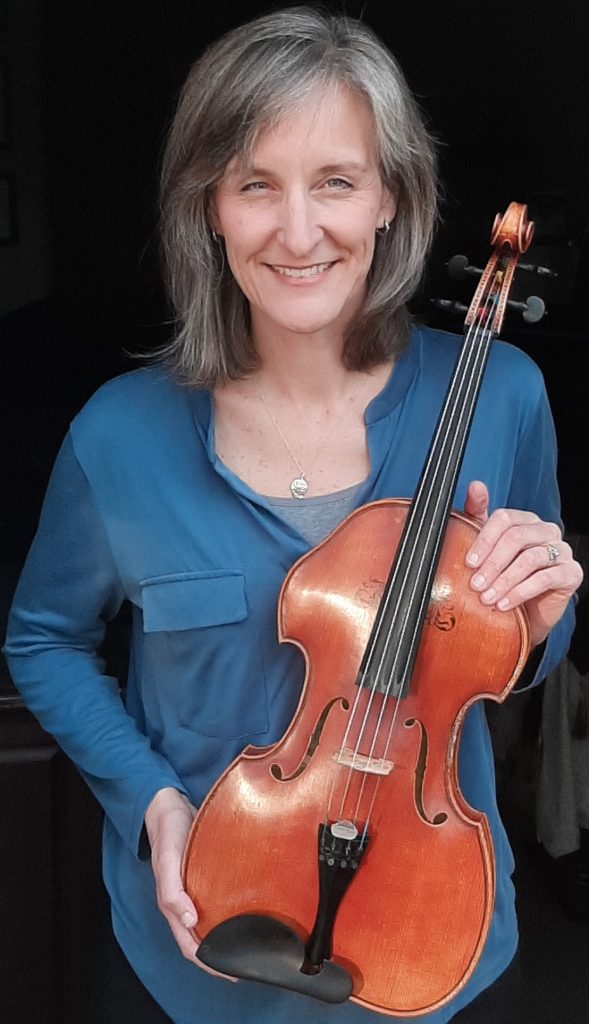A New American Angle
In Spring 2020, the sudden quieting of the nation’s performing organizations, as well as the closure of most public venues, was deafening in its silence. Out of that silence, I found an opportunity to continue to provide music, often in different ways than the traditional theater experience. And through that opportunity, a chance to focus on an American repertoire that represents a more diverse group of composers.

Initially, when my fellow musicians fanned out across Indianapolis playing for neighbors in driveways, backyards, and parking lots, we saw the beauty of live music wash over people who were aching not just for entertainment but community. And the shared enjoyment of what we offered bound us together in a degree of healing that many of us didn’t know we needed.
Personally, my outdoor concert experience began in my driveway in May 2020, playing a short program for neighbors with tubist Tony Kniffen, my husband, and Assistant Concertmaster Peter Vickery. It had been a rough week in Indianapolis and playing the concert felt a little bit like a group therapy session.
That kind of therapy repeated throughout the summer, and as it continued, I became increasingly impressed with the creativity of my colleagues. Eventually, when the demand for concerts increased I started programming string quartet concerts and wound up playing several times per week throughout the good weather.
The programs were a mixture of popular and serious music, about an hour long and increasingly geared to exploring unheard voices. We offered a chat about the music and personal experience between selections and we enjoyed the proximity to our audience. Kids who had just chosen instruments as well as those who were about to choose got up close and personal to our great delight. Many people who had not ever been to a concert discovered that they really enjoyed the experience, and we got the pleasure of sharing live music with each other as well as the audience.
Some of our programs, accompanied by a rudimentary lesson plan, were used in schools this spring, as orchestra field trips were nonexistent and school orchestra directors were expressing a pressing need for inspiration for their students. The faces of the students showed the impact of hearing not just professional musicians, but a program including a diversity and representation of voices that they hadn’t expected.
So when I found myself coming up with a new Americana program a few weeks ago, I approached from a different mindset than I might have at this time last year. America has been referred to in that wonderful way as a melting pot. We are a country that has been the respite of people from all over the globe.
Initially, the program offered a flavor of Scots Irish from Appalachia, music of Pulitzer prize winner George Walker, songs of the wild west, a jazz-influenced lullaby from David Baker, a groovy piece by ISO bassist Peter Hansen, as well as a bit of Broadway. There are endless nationalities that could be represented, but I realized at some point that these are all immigrant voices. Was there a Native American voice that could also be represented?
A quick google search showed an extensive array of Native American composers and much music that evoked powerful images from a rich heritage. One program in particular caught my attention, partially because of how extensively it reached across cultural borders, and also because I recognized the name of a colleague from previous teaching at the MasterWorks Festival. Delta David Gier is music director of the South Dakota Symphony Orchestra and it was in conversation with him that a delightful piece bubbled to the surface.
The piece was written by Alex Trujillo, a young Lakota musician, and came out of the Music Composition Academy that was created by Jerod Impichchaachaaha’ Tate in conjunction with the SDSO. It seemed respectfully appropriate for the program about the music that America has offered the world to begin with a native voice.
I don’t consider myself an authority on any culture. I am just a musician trying to navigate the roller coaster that this last year has been. But I also want to learn more about how to authentically represent the voices of the people who live here. Like the country itself, my Americana program grows and changes, guided by a respectful desire to express our collective voices, our shared expression, and our national community.